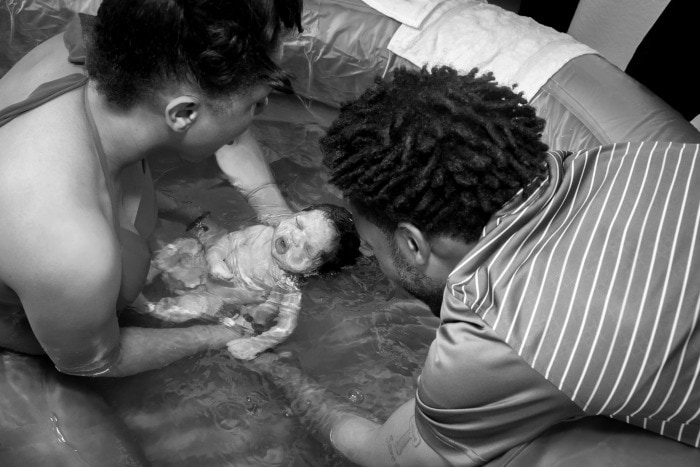Do you know the right questions to ask a midwife at an interview or first consult? Choosing a midwife to assist in the birth of your child is a significant decision that can have a lasting impact on your pregnancy and delivery experience. In order to find the right fit, it’s important to ask thoughtful questions during your first meeting. From their qualifications and experience, to their approach to childbirth and postpartum care, asking the right questions can help you make an informed decision.
The purpose of the initial interview is to see if you and she would be a good fit. Does she seem like a person you could trust? Is she straightforward, or does she evade certain questions? Do you like her vibe? Just like you, she’s also looking to see if you’re someone she can trust, communicate well with, and on the same page. (Tip: Keep a look out for red flags!)
The following are my favorite questions to ask a midwife to facilitate conversation during a phone or in-person interview.
NOTE: It’s not necessary to ask every single question. Remember, you’re trying to get a sense of her character, if you align with her birthing philosophies, and things like that. If you don’t get to ask all your questions, you can certainly ask more down the road at your prenatal appointments.
On This Page
10 minute read
↓Initial Questions to Ask a Midwife
↓Questions About Prenatal Care
↓Questions About The Birth
↓Questions About Interventions and Complications
↓Questions About Postpartum Care
↓Midwife Interview Tips
Initial Questions to Ask a Midwife
- Are you available for my due date?
Ask this question first so you don’t waste anybody’s time. There’s no sense moving forward if she’s unavailable for your due date! - What brought you to birth work? How long have you been a midwife?
These are good questions to ask a midwife to better understand her story, birthing philosophy, and experience. - What type of midwife are you – CNM (certified nurse midwife), LPM (licensed professional midwife), or CM (certified midwife)? Where do you attend births – hospital, birth center, and/or home?
It’s important to understand what type of midwife she is and where she attends births. If you’re hoping for a homebirth, but she only works through a birth center, you might need to find someone else. - How many births have you attended? How many clients do you have every month?
The answer to this question will help parents understand a midwife’s experience, but how active and current she is in her profession. It will also shed some light on how often she needs backup, her popularity, etc. - Do you work in a partnership with another midwife or other midwives? How does that work?
This is an important question to ask to help figure out who could potentially be at your birth. If she’s in a practice with multiple midwives who share call, you may need to interview them too. - Do you have experience working with clients like me?
You are uniquely you! Whatever makes you you, you’ll want to find a midwife that is a good fit for you and your situation or lifestyle. - What is your fee and what does it include? Do you take insurance?
Don’t be afraid to ask specific questions about fees, payments, and expectations regarding insurance. Is she cash only? Is she in-network with your health insurance? Will she file a claim for you? Does she offer any discounts?

Questions About Prenatal Care
The following questions to ask a midwife will help you better understand the expectations of prenatal care, but also more about her philosophy on healthy pregnancy and natural birth.
- How frequent are prenatal appointments? Where will these appointments be?
These are good questions to ask for logistic reasons, but also so you both have the same expectations regarding prenatal care. - Do you provide nutrition information and counseling?
Nutrition is a big part of keeping a pregnancy low-risk! This is an important part of prenatal care. - Will I need to go elsewhere for bloodwork, ultrasounds, and other testing?
This is a good question to ask for logistics and planning purposes, but to also better understand her expectations and philosophy regarding tools and tests during pregnancy. - When and how would you want me to contact you? When should I not contact you?
Clear expectations and boundaries are so important for a healthy midwife-client relationship. - How would you monitor my and my baby’s well-being during pregnancy? How would you recommend I stay healthy and low risk?
This question will give you a better idea of how a midwife monitors pregnancy to ensure everything continues to stay low-risk. - What would risk me out of your care?
The answer to this question varies by state and practice. For example, Florida is pretty specific about what would risk a woman out of a licensed midwife’s care. Other states may have a lack of legislation regarding midwifery leaving the burden on midwives to determine what is out of their scope of practice. - Do you recommend that I take a childbirth class?
Does your midwife value childbirth education? Does she or other birth professionals in the area offer this service?

Questions About the Birth
These questions to ask a midwife about birth will help you to better understand your midwife’s expectations and philosophies regarding natural birth.
- Do you bring anybody like an additional midwife or childbirth assistant with you to births?
Most parents want to know who will be at their birth. Midwives usually bring someone with them, whether that’s an additional midwife, student midwife, or childbirth assistant. - What are your thoughts about me hiring a doula? What about a birth photographer?
Not only will you better understand her philosophies regarding birth, but you may even get some good recommendations for birth doulas and photographers. - Do you offer water birth? Who is responsible to set up and take down the birth pool?
Most midwives support water birth. How will she help facilitate immersion in warm water during birth? - What birth supplies will I be responsible for providing? What birthing tools will you bring to the birth?
This is a question for the planners out there. Some parents love this bit. (It’s me! I’m the planner that loves this bit!) - How often do you monitor baby’s heart rate during labor? What tools do you use to do this?
Again, this is a good question to ask to better understand expectations at birth, but also a midwife’s protocol to keep mom and baby safe and healthy. - What is your philosophy on vaginal exams/cervical checks during pregnancy and labor?
Many women want to know their cervical progress in labor, some are on the fence, and others want nothing to do with it. What does your midwife say? - Can my partner catch the baby? What are the pros and cons of a dad catching their baby?
This is a fun question to ask and think about.

Questions About Interventions and Complications
The following are more questions to ask a midwife about common interventions and complications.
- When would you suggest breaking my water bag or amniotic sac? What are the risks of this?
Most midwives have an amniohook in their birth bag to break a woman’s water. When would she want to pull it out? - How do you try to prevent tearing? Can you repair tears if needed?
- When would you do an episiotomy?
Believe it or not, midwives sometimes do episiotomies on mothers. What does your midwife think about episiotomies? - How do you handle postpartum hemorrhage? When would I receive Pitocin immediate postpartum?
Excessive postpartum bleeding is something midwives keep a close eye on. How do they typically manage postpartum bleeding? - What is the most common reason you would transfer someone to the hospital in labor?
I love this question because I think it helps parents understand that most of the time when a woman transfers to the hospital in labor it is not an emergency. - Do you have a good relationship with a backup OBGYN and hospital?
A solid backup situation with a local OB is important part of the midwifery model of care. Who backs her up? - If I were to transfer to a hospital, would you transfer with me?
Different midwives answer this question differently. See what she has to say. - What is your cesarean rate?
The World Health Organization encourages a cesarean rate around 10-15%. How does her cesarean rate compare?

Questions About Postpartum Care
Use the following questions to ask a midwife to better understand her thoughts, philosophies, and procedures regarding postpartum care.
- What routine newborn procedures do you offer after birth?
Does your midwife offer the vitamin K shot or other medicines for the baby? - When do you typically cut the cord?
Does she cut the cord immediately? After 2-3 minutes? Does she offer delayed cord clamping? - How long do you stay after delivery?
Sometimes parents are caught off guard how quickly they’re on their own as first time parents. - Will we need to leave our home in the first week for any appointments, tests, or procedures?
When does baby need to see a pediatrician? How do we schedule a hearing screen for baby? - What’s the most common breastfeeding challenge your clients have? When would you recommend I see a lactation consultant?
- If I think I may be experiencing a postpartum mood disorder, what should I do?
This is a helpful question to ask a midwife to see her philosophy on postpartum depression and other mood disorders, but also to get a sense of holistic postpartum mental health resources available in your community. - How many postpartum visits will you do?
One of the benefits of an out of hospital midwife is the quality and frequency of postpartum care. How many visits does the midwife offer before you’re discharged from her care?

More Midwife Interview Tips
Look Out for Red Flags
It’s important to keep an eye out for red flags when looking for any care provider, an OB or a midwife. If a midwife is dismissive of you or your concerns, rushes through the interview, or doesn’t value informed consent, they might not be a good fit.
Interview Multiple Midwives
Interview more than one midwife! Not only will this help you explore your options, but it will help you get better at asking good questions.
Ask Local Doulas
Doulas are a wonderful resource when it comes to choosing a good care provider. Call a few doulas on the phone or meet in person (they’re more likely to speak their mind if it’s not recorded in an email) to better understand the 411 on the local midwife situation.
More Questions to Ask a Midwife?
Do you have more questions to ask a midwife? Did I leave something out? Leave a comment and share with the Mother Rising community what questions you would ask when looking for a midwife.
